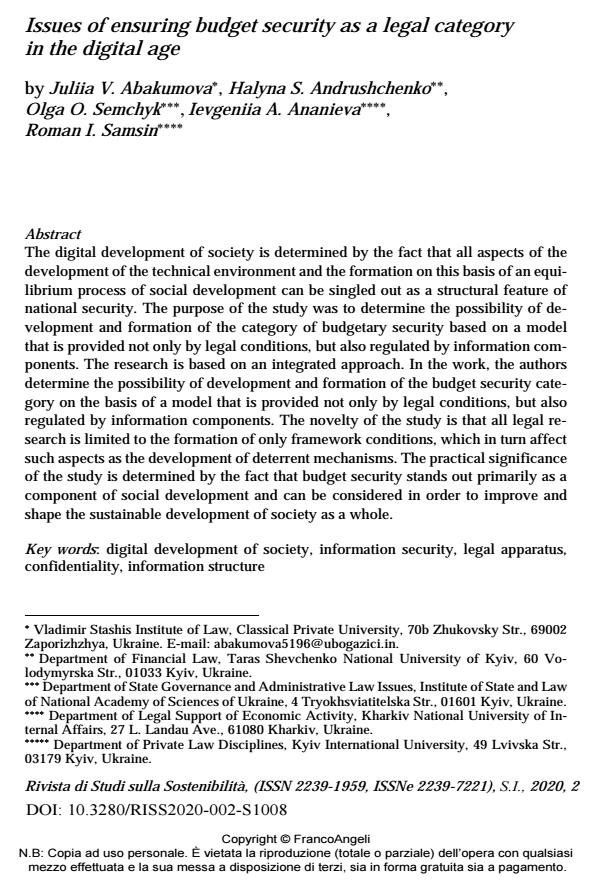Issues of ensuring budget security as a legal category in the digital age
Titolo Rivista RIVISTA DI STUDI SULLA SOSTENIBILITA'
Autori/Curatori Juliia V. Abakumova, Halyna S. Andrushchenko, Olga O. Semchyk, Ievgeniia A. Ananieva, Roman I. Samsin
Anno di pubblicazione 2021 Fascicolo 2020/2 suppl. Lingua Inglese
Numero pagine 16 P. 97-112 Dimensione file 273 KB
DOI 10.3280/RISS2020-002-S1008
Il DOI è il codice a barre della proprietà intellettuale: per saperne di più
clicca qui
Qui sotto puoi vedere in anteprima la prima pagina di questo articolo.
Se questo articolo ti interessa, lo puoi acquistare (e scaricare in formato pdf) seguendo le facili indicazioni per acquistare il download credit. Acquista Download Credits per scaricare questo Articolo in formato PDF

FrancoAngeli è membro della Publishers International Linking Association, Inc (PILA)associazione indipendente e non profit per facilitare (attraverso i servizi tecnologici implementati da CrossRef.org) l’accesso degli studiosi ai contenuti digitali nelle pubblicazioni professionali e scientifiche
The digital development of society is determined by the fact that all aspects of the development of the technical environment and the formation on this basis of an equilibrium process of social development can be singled out as a structural fea-ture of national security. The purpose of the study was to determine the possibility of development and formation of the category of budgetary security based on a model that is provided not only by legal conditions, but also regulated by infor-mation components. The research is based on an integrated approach. In the work, the authors determine the possibility of development and formation of the budget security category on the basis of a model that is provided not only by legal conditions, but also regulated by information components. The novelty of the study is that all legal research is limited to the formation of only framework condi-tions, which in turn affect such aspects as the development of deterrent mecha-nisms. The practical significance of the study is determined by the fact that budget security stands out primarily as a component of social development and can be considered in order to improve and shape the sustainable development of society as a whole.
Keywords:Digital development of society, information security, legal apparatus, confidentiality, information structure
- Akatkin Yu., Yasinovskaya E., Drozhzhinov V. and Konyavskiy V. (2016). Towards the Digital Government in Russia: Integrative Approach. In: ACM International Conference Proceeding Series. St. Petersburg: EGOSE.
- Bondarenko S., Liliya B., Oksana K. and Inna G. (2019). Modelling instruments in risk management. International Journal of Civil Engineering and Technology, 10(1): 1561-1568.
- Breul J. D. (2017). Open to the public: Evaluation in the public sector. New York: Routledge.
- Brodskiy A.V., Gorbachev V.A., Karpov O.E., Konyavsky V.A., Kuznetsov N.A., Raigorodskii A.M. and Trenin S.A. (2019). Identification in digital economy computer systems. Journal of Communications Technology and Electronics, 64(12): 1493-1499.
- Cunha M. A. V. C. D., Coelho T. R. and Pozzebon M. (2014). Internet and participation: The case of digital participatory budgeting in Belo Horizonte. RAE Revista de Administracao de Empresas, 54(3): 296-308.
- Flint E. and du Plooy S. (2018). Extending risk budgeting for market regimes and quantile factor models. Journal of Investment Strategies, 7(4): 51-74.
- Halawa M. and Olcoń-Kubicka M. (2018). Digital householding: Calculating and moralizing domestic life through homemade spreadsheets. Journal of Cultural Economy, 11(6): 514-534.
- Hudák M. (2015). Sustainability of digital public spaces. Quality Innovation Prosperity, 19(1): 103-111. DOI: 10.12776/QIP.V19I1.381
- Iasulaitis S., Nebot C.P., Da Silva E.C. and Sampaio R.C. (2019). Interactivity and policy cycle within electronic participatory budgeting: A comparative analysis. Revista de Administracao Publica, 53(6): 1091-1115.
- Korachi Z. and Bounabat B. (2019). Integrated methodological framework for digital transformation strategy building (IMFDS). International Journal of Advanced Computer Science and Applications, 10(12): 242-250.
- Limao J. P. (2018). Participatory budgeting in the regional press: A case study. Estudos Em Comunicacao, 2(26): 93-104.
- Martinez J., Newsome K. L. and Sheble M. A. (1998). Planning and budgeting the transition to a digital tomorrow. Serials Librarian, 34(3/4): 353-360.
- Naumenkova S., Mishchenko S. and Dorofeiev D. (2019). Digital financial inclusion: Evidence from Ukraine. Investment Management and Financial Innovations, 16(3): 194-205.
- Nurbasari A., Lukiyanova M.N., Nguyen P.T., Shichiyakh R.A. and Shankar K. (2019). Role of social media in the successful implementation of business user data management. Opcion, 35(88): 2899-2921.
- Pozzebon M., Cunha M. A. and Coelho T. R. (2016). Making sense to decreasing citizen e-Participation through a social representation lens. Information and Organization, 26(3): 84-99.
- Stortone S. and De Cindio F. (2014). “BiPart” of participatory budgeting. A software platform for new political practices. Innovation and the Public Sector, 21: 30-39.
- Stortone S. and De Cindio F. (2015). Hybrid participatory budgeting: Local democratic practices in the digital era. Citizen’s Right to the Digital City: Urban Interfaces, Activism, and Placemaking, 3: 16-19.
- von Fröhlich S. (2013). The journey is its own reward! Design and implementation of digital archive projects. VOEB-Mitteilungen, 66(1): 132-144.
- Wetherbe J. C. and Dickson G. W. (1979). Zero-based budgeting: An alternative to chargeout systems. Information & Management, 2(5): 203-213.
Juliia V. Abakumova, Halyna S. Andrushchenko, Olga O. Semchyk, Ievgeniia A. Ananieva, Roman I. Samsin , Issues of ensuring budget security as a legal category in the digital age in "RIVISTA DI STUDI SULLA SOSTENIBILITA'" 2 suppl./2020, pp 97-112, DOI: 10.3280/RISS2020-002-S1008